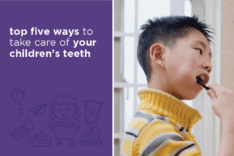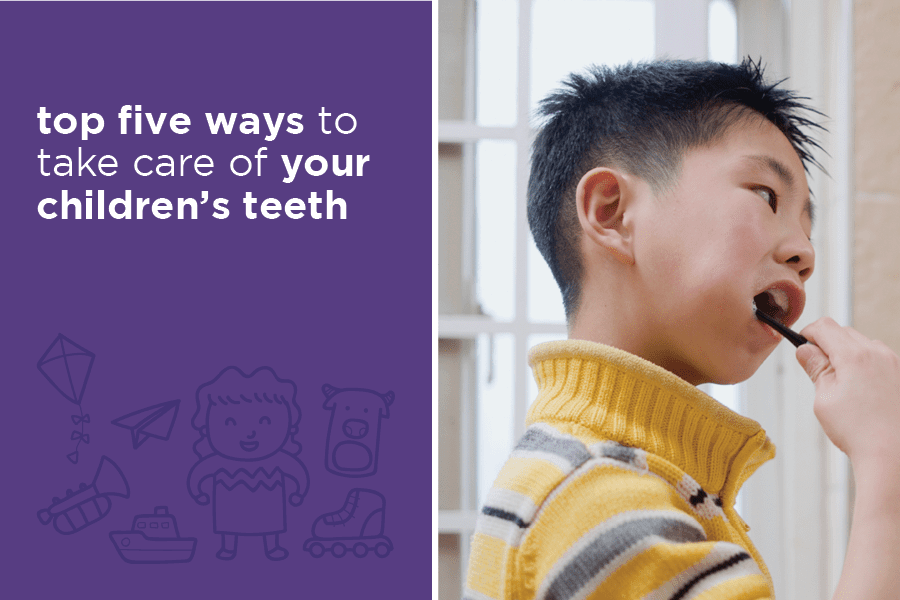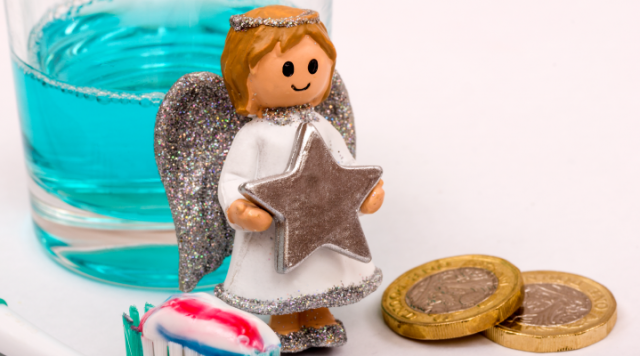Top 5 ways to take care of your children’s teeth

You’ve probably seen the struggles of getting kids to brush their teeth. However, making your child’s oral health a priority is important for their overall wellbeing.
Believe it or not, there are things parents can do before birth to kickstart their child’s oral health. After birth, the journey to a healthy and happy mouth starts much sooner than many people may think. Keep reading to learn about the top five ways to take care of children’s teeth.
Good oral health starts before birth
Many women are unaware that their oral health habits during pregnancy can impact their unborn child’s oral health. Additionally, pregnant women are more likely to experience dental problems due to changes in hormones and symptoms of pregnancy.
- 60 to 75% of pregnant women have gingivitis due to the changing of the hormones while pregnant. Gingivitis can lead to preterm birth and low birth weight.
- One in four pregnant women develop untreated cavities. Cavities can be passed on to the child during pregnancy or even after the baby is born.
- Children whose mothers have untreated cavities are three times more likely to develop cavities early in life.
Taking care of oral health before birth is important for both the mother and baby. Click here for more information on pregnancy and oral health.
Start oral health care young
Now that we know oral health care begins before birth, let’s dive into what infant and young child oral health care should look like.
Oral health routine tips for an infant/young child:
- After birth, clean your baby’s mouth by wiping the gums with a gauze pad or a clean washcloth.
- Begin brushing the child’s teeth as soon as they come in. Brush twice daily (morning and evening) and use fluoride toothpaste once the child can spit it out.
- Prevent baby bottle tooth decay. Don’t give children anything other than water before bedtime or naptime. Remember to clean the baby bottle after each use.
- When your child starts to brush on their own, supervise them to make sure they are brushing all their teeth and they are using an appropriate amount of toothpaste.
- Teach your child to brush twice a day with a children’s toothbrush, using a pea-sized amount of fluoride toothpaste.
If you aren’t comfortable with your child brushing on their own, continue to brush for them and ask your dentist for tips and tricks if your child isn’t picking it up.
Model good oral health behaviors
Children love to mimic their parents. You may think your child is not watching but they see more than you think, so keep this in mind when teaching them about the importance of their oral health routine.
Here are some tips to teach your child to correct way to brush:
- Splash your toothbrush with water.
- Apply fluoride toothpaste (using a pea-sized amount of toothpaste).
- Hold the toothbrush at a 45-degree angle.
- Insert the toothbrush into your mouth and begin gently brushing back and forth on each tooth. During these two minutes of brushing, you should spend about 30 seconds in each of the four quadrants of your mouth.
- Repeat this process twice a day.
Remind your child that although two minutes might seem like an eternity, it is important for each tooth to be brushed and cleaned correctly.
Use the right oral health tools
Oral health care can only be effective if you have the proper oral health tools. Here are some of the items you need to take care of your child’s mouth and teeth:
- Moist gauze pad or clean washcloth (use before the child’s teeth appear)
- Fluoride toothpaste
- Child toothbrush (ADA-approved)
- Dental floss
- Consistent dental checkups (at least once a year)
The tools used to keep a kid’s mouth healthy are not all that different from an adult, but it’s important to find toothbrushes, toothpaste, and other oral health helpers that are the right fit for little hands and mouths.
See a dentist early
Teaching your child about the importance of oral health is necessary, but there is only so much that can be done without visiting the dentist. We recommend that parents and their children visit the dentist at least once per year. These dental visits are significant because dentists can clean areas in your mouth that aren’t reachable with a toothbrush or floss. This is especially important for children as they are more likely to miss spots when brushing. Your child’s dentist can also spot signs of tooth decay and possible cavities.
Click here to find a dentist and schedule an appointment today.
Want to learn more about pediatric oral health? Check out this blog:
Related stories
-
A History of Halitosis and the Listerine Marketing Campaign
Bad breath can happen to any of us. What we eat, how often we brush, and if … Read More
-
Swimming Pools and Your Teeth | The Link Between Chlorine and Teeth
It’s no secret that most pools contain chlorine, a chemical used to kill germs. However, you might be … Read More
-
National Tooth Fairy Day Video
She’s a bit flighty, she sprinkles sparkles where she goes, and she’s the biggest advocate for healthy … Read More
Sign Up Now
Most Liked
- 1 Do Expiration Dates on Dental Products Matter? 305 Likes
- 2 Is Activated Charcoal Safe for your Smile? 167 Likes
- 3 Crazy and Cool Fish Teeth Facts 92 Likes
- 4 What Are Tonsil Stones? 81 Likes
- 5 Delta Dental Protects Your Eyes with DeltaVision® Coverage 74 Likes
- 6 The In-between Tooth: Guide to Bicuspids 53 Likes
- 7 Recipe: Quick Pumpkin Pudding 49 Likes
- 8 Bad Taste After Brushing? Common Explanations 44 Likes
- 9 People with Dental Benefits are Healthier 40 Likes
- 10 Own Your Oral Health: Subscribe now for tips to ensure a bright smile 39 Likes




